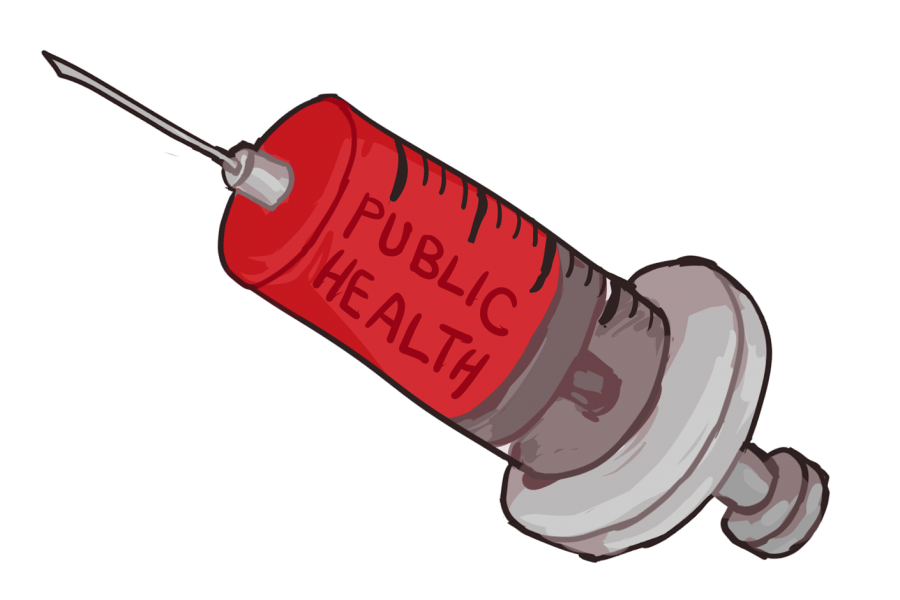Anti-vax is dangerous to society’s safety
April 15, 2019
Vaccines have become a vital part of modern life in the United States for their role in eradicating diseases. According to the CDC, before vaccines it was not uncommon to hear that someone had Polio, Tetanus, Hepatitis B, rubella, or chickenpox. However, it is now uncommon to hear of someone getting many of these diseases. This is directly correlated to the introduction to vaccines and how they have removed many of these diseases. Because of the health benefits vaccines bring to our society as a whole, the implementation of punishments for those that unjustifiably refuse vaccinations may be necessary to ensure everyone’s safety.
According to the CDC, 95% of kindergartners in the United States were vaccinated in 2014. The other 5% that were not vaccinated were comprised of children who require an exemption for religious and medical reasons, along with the parents who believe vaccines are dangerous and cause more harm than good.
For example, vaccines have proven to have benefits that far outweigh the risk. According to the CDC, vaccines are also tested and proven to be safe and effective (not including extremely rare and unexpected allergic reactions). Getting vaccinated protects those around you from being introduced to harmful diseases. They save you money by providing a second layer of defence from diseases that are accompanied by mountains of medical bills. Above all, they protect future generations by diminishing and destroying diseases that used to kill thousands a few generations ago.
Since vaccines have halted most of the deaths caused by diseases, not getting vaccinated is similar to allowing many diseases to continue to spread. In order to ensure these diseases are no longer infecting people and stoping many disease related deaths, legal punishments should be put into place for those who unjustifiably refuse vaccines.
In 48 out of the 50 U.S. states, exemption for religious and medical reasons are accepted and people that require an exemption are granted one. Although, West Virginia and Alabama do not allow any exemptions for receiving vaccines. According to The National Conference of State Legislatures, medical and religious exemptions are rare; in Florida only 400 medical exemptions and 4,000 religious exemptions were made each year. Shown by the previous statistics, very few people receive vaccine exemptions. That is to say that the 5% of kindergartners previously noted to have not received vaccines are not all represented in the exemption category. According to the CDC, a majority of the 5% of kindergartners that do not receive vaccines do so without a religious or medical reason.
According to CNN, some adults choose not to vaccinate their kids because few believe a number of things which are all unsubstantiated by reliable scientific evidence: vaccines may cause autism, vaccines do not help their children and may cause suffering, and medical professionals do not have their children’s best interest at heart. Additionally, a small portion of the population believes it is their right to be able to refuse a vaccine and uphold their liberty. Although this is not a matter of someone wanting to hold onto a right that guarantees them a fair and free life, vaccines have provided a degree of safety that invalidates the liberty argument for refused vaccinations.
Over time it has become unacceptable by most of society to refuse vaccines for invalid reasons. It is reasonable and responsible as a society to have laws put into place to ensure parents are legally required to provide vaccines for their underage children. A solution to the problem could involve implementing a system where adults over 18 are still allowed to choose whether to get vaccines or not. But children, will be legally required to do so, to ensure their safety and the larger societies safety. In order to ensure all children under the age of 18 receive vaccines, punishments, such as, large fines and possibly forced vaccinations should be considered for those who continue to disobey without a religious or medical reason. It is unrealistic to expect every person in America to receive a vaccination and an adult should have the freedom to choose. But children who are under the opinion of their parents, must have a requirement, because their parents’ beliefs might cause them to receive a deadly disease against their will.





